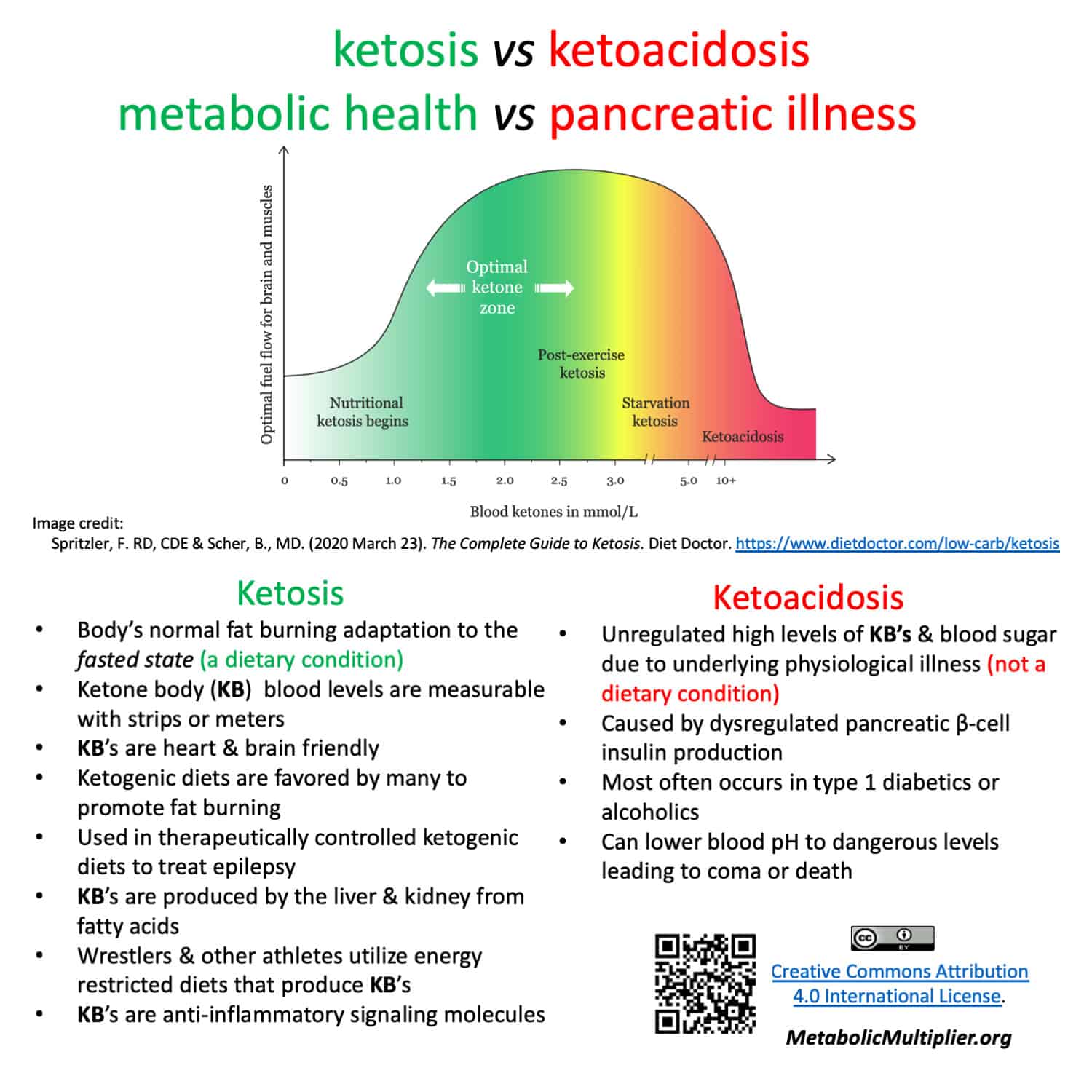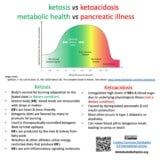Ketosis versus ketoacidosis, metabolic flexibility or pancreatic disability?
Ketosis is the natural production of ketone bodies in the fasted state by the liver and kidney from fatty acids. Ketoacidosis (a.k.a. acetonenia, acetonuria, ketoaciduria, ketonuria) is the result of dysregulated pancreatic β-cell (beta-cell) insulin production.
Ketosis versus ketoacidosis, metabolic flexibility or pancreatic disability?
Where’s a good definition of ketosis? || Should “ketosis” fall under “ketoacidosis” in a medical dictionary? || Should MeSH modify the current search tree for ketosis? || Is a low-carb diet dangerous? || Ketosis – is it a disease or natural metabolism? | Mesh definitions | 10 weeks – Keto over MetS | Ketone Bodies – aren’t those acids instead of proteins? || Ketosis – following the MeSH tree. Is it a disease? || Ketosis – what are the MeSH preferred terms for it? || Precision or accuracy, does it matter in nutrition? | Ketosis and bio-individuality | How do you differentiate between ketosis and ketoacidosis?
Where is there a ‘good’ definition of ketosis?
I looked up “ketosis” as I was reviewing medical definitions using the US National Library’s MeSH Descriptor Data 2020. MeSH uses ketosis as a synonym for the metabolic disease ketoacidosis. MeSH synonyms are Acetonemia, Acetonuria, Ketoacidemia, Ketoacidosis Ketoaciduria, Ketonemia, Ketonuria, and Metabolic Ketoacidosis. Differentiating between a healthy state of metabolic ketosis and a life-threatening illness, ketoacidosis, is important. Ketosis is often used both personally and therapeutically for personalizing nutrition. Would it be appropriate to ask the NIH help desk for a correction or amendment to separate the normal body function from the disease? Here is the thinking:
Should “ketosis” fall under “ketoacidosis” in a medical dictionary?
Perhaps not. Isn’t ketosis a natural body response to the fasted state? Isn’t ketoacidosis an illness? “Ketone bodies” are defined in MeSH in a manner more closely aligned with a natural body function. However, they give ketosis as a synonym for ketoacidosis.
Should MeSH modify the current search tree for ketosis?
Perhaps yes. Currently, a search for ketosis returns medical cases, whereas a search for ketone signals returns articles referring to a “normal” ketogenic metabolism.
- For example, Ketone bodies as signaling metabolites.
Is a low-carb diet dangerous?
Am I missing something? If your doctor believes that ketosis and ketoacidosis are the same, then he might consider a low-carbohydrate diet to be dangerous. There are many anecdotes of diabetics reversing their hypo- & hyperglycemia without ketoacidosis while reducing their need for medication. 1,2 A very low-calorie ketogenic diet (VLCKD) conducted over 4 months showed that ketosis can be an important therapy in obesity and diabetes management. 3
Ketosis – is it a disease or natural metabolism?
We knew in 1917 ketones are protein sparing?
“The protein-sparing power of fat is known to persist in diabetes. Therefore the absolute and relative increase in fat combustion now appears a sufficient explanation of the slight increment of ketonuria following any single fat meal, and the summation of such effects presumably accounts for the results of longer feeding, so that there is at present no evidence of a metabolic distinction between food fat and body fat. The relief of diabetic acidosis by fasting is doubtless due not only to diminished combustion of fat but also to a beneficial effect of undernutrition upon the assimilation of all classes of food. (Allen 1917)[Added emphasis.]4
MeSH equates ketosis and ketoacidosis
MeSH (Medical Subject Headings) is the U.S. National Library of Medicine’s controlled vocabulary thesaurus used for indexing articles for PubMed. I use it to ensure that my writing is in consonance with current medical terminology. However, when it comes to the natural state of ketosis, e.g. where the liver and kidneys generate ketone bodies from fatty acids, there’s a conflict in MeSH.
- MeSH Heading Ketosis
- Tree Number(s) C18.452.076.176.652
- Unique ID D007662RDF
- Unique Identifier http://id.nlm.nih.gov/mesh/D007662
- Annotation high levels of ketone bodies; do not confuse with KETOSES (monosaccharides); ketogenesis is probably KETONE BODIES/biosyn
- Scope Note A condition characterized by an abnormally elevated concentration of KETONE BODIES in the blood (acetonemia) or urine (acetonuria). It is a sign of DIABETES COMPLICATION, starvation, alcoholism or a mitochondrial metabolic disturbance (e.g., MAPLE SYRUP URINE DISEASE).
- Entry Term(s) Acetonemia Acetonuria Ketoacidemia Ketoacidosis Ketoaciduria Ketonemia Ketonuria Metabolic Ketoacidosis Metabolic Ketosis
- See Also Ketone Bodies
- Public MeSH Note 91; was see under ACIDOSIS 1975-90
- Online Note search ACIDOSIS 1966-74
- History Note 91(75); was see under ACIDOSIS 1975-90
- Date Established 1991/01/01
- Date of Entry 1999/01/01
- Revision Date 2013/07/08
10-weeks of ketosis dramatically improved MetS
Is metabolic syndrome (MetS) reversible? A recent study over several months shows it’s possible.5
The results demonstrated that the change over time from week 0 to week 10 was significant (p=0.001) in the ketogenic group for weight, body fat percentage, BMI, HgA1c and ketones. All variables for the ketogenic group out-performed those of the exercise and non-exercise groups, with five of the seven demonstrating statistical significance.
(Gibas 2017)[Added emphasis.]
Ketone Bodies – aren’t those acids instead of proteins?
As you can see it’s good to go to the references. You always learn something. Had you heard of maple syrup urine disease (MSUD) before this? Isn’t MSUD a rare genetic disease in which amino acids aren’t properly processed rather than fatty-acid metabolism? Low-carb enthusiasts would probably agree with the following definition of ketosis. However, it is under ketone bodies in MeSH.
- MeSH Heading Ketone Bodies
- Tree Number(s) D02.522.585
- Unique ID D007657RDF
- Unique Identifier http://id.nlm.nih.gov/mesh/D007657
- Annotation ketogenesis is probably KETONE BODIES/biosyn
- Scope Note The metabolic substances ACETONE; 3-HYDROXYBUTYRIC ACID; and acetoacetic acid (ACETOACETATES). They are produced in the liver and kidney during FATTY ACIDS oxidation and used as a source of energy by the heart, muscle and brain.
- Entry Term(s) Acetone Bodies
- Registry Number 0
- See Also Ketosis
- Date Established 1966/01/01
- Date of Entry 1999/01/01
- Revision Date 2010/06/25
Ketosis – following the MeSH tree. Is it a disease?
Is ketosis a nutritional state or metabolic disease? Is it a healthy sign of metabolic flexibility? Should it be moved out of the category of Metabolic Diseases?
Nutritional and Metabolic Diseases [C18]
However, a recent study points out the important therapeutic properties of ketone bodies.6
In addition to acting as an alternative energy source, β-HB (β-hydroxybutyrate) is also a potent metabolite that regulates cellular signals by targeting diverse biomolecules. β-HB is a tiny molecule that can easily pass through cell membranes and circulate throughout the body in the blood vessels, even reaching the brain through the blood-brain barrier (BBB). This feature provides an advantage to β-HB over other existing drugs for the treatment of neurological diseases.
(Han 2020) [Added emphasis.]
Ketosis – what are MeSH preferred terms for it?
Low-carb enthusiasts would agree with MeSh. Ketosis is preferred.
- Ketosis Preferred
- Metabolic Ketosis Narrower
- Concept UI M0544041
- Terms Metabolic Ketosis Preferred Term
- Term UI T766571
- Date 03/03/2010
- LexicalTag NON
- ThesaurusID NLM (2011)
- Metabolic Ketoacidosis
- Acetonemia Narrower
- Ketonuria Narrower
Precision or accuracy, does it matter in nutrition?
In shooting firearms, precision is hitting the same spot over and over. Accuracy is hitting the target. If nutrition is not both precise and accurate, can it have the intended results? If we lack language to describe the processes involved in shifting into the fasted state as healthy, won’t that affect medical recommendations? Ketosis is measurable with handheld devices and its salubrious effects are enjoyed by thousands. Is it time to stop classifying it as a metabolic illness?
Both pure and applied science have gradually pushed further and further the requirements for accuracy and precision. However, applied science, particularly in the mass production of interchangeable parts, is even more exacting than pure science in certain matters of accuracy and precision.
Shewhart, W.A.; Deming, W. E. (1939). Statistical Method from the Viewpoint of Quality Control. The Graduate School, The Department of Agriculture. p. 120 [Added emphasis.]
Ketosis and bio-individuality
Bio-individuality may result in different reactions to dietary interventions.
Since individual differences make it difficult to control the optimal circulating β-HB levels by calorie restriction or a ketogenic diet, it is necessary to develop adjustable treatment options, such as KE (ketone ester) administration. As abrupt changes in circulating β-HB may disrupt energy homeostasis, the chiral enantiomer s-β-HB may offer a potential option for therapeutics, as this molecule cannot be used as an alternative energy metabolite.
(Han 2020) [Added emphasis.]
Human biodynamics cannot be mass-produced or easily replicated. Bio-individuality requires adaptation of general practices for each person’s body. Therefore, for personalized nutrition, accuracy and precision matter even more than in factory products. We have the tools to measure ketone bodies and their beneficial effects. Doctors use therapeutic ketogenic diets to alleviate mental and metabolic conditions. Let’s take the term ketosis out of the dog house and bring it into the living room.
How do you differentiate between ketosis and ketoacidosis?
Might clearing up these differences in how medical definitions are classified, facilitate constructive conversations among medical professionals? Might this added clarity benefit patients? Please let us know in the comments.
You might enjoy reading:
- What is metabolic health anyway?
- Diabetes Dirge, aka Diabetes for Dummies, learning to use big words to create positive health
- Coronavirus quarantine – how a lifetime in submarines eases my use of isolation for self-improvement
Other resource guides & toolkits you might value
Curious about improving metabolic health with lifestyle?
- Lifestyle Medicine, the key to metabolic healing
- What is metabolic health? A layperson’s definition and a biochemist’s perspective
Where do I start improving my metabolic health?
- Your patient toolkit for prediabetes & type 2 diabetes
- What to eat? Get clever! Clinicians’ flexible approach to tailoring carb reduction to you.
- Want more detail on carbohydrate reduction? A round-up of quality, what-to-eat guides from around the web
- Best resources for an overview of keto – Metabolic Multiplier’s round up of the best resources we’ve found by evidence-based organizations & clinicians. For patients, families & caregivers.
- Keto doctors near me – over 20 directories of low-carb professionals
For clinicians using therapeutic carbohydrate reduction (TCR), ketogenic diet therapies (KDT)
- Best Keto resources for clinicians & other practitioners
- How to build my ketogenic therapy treatment team – Support for the more complex cases.
- Why write medical case reports about unique cases? – Our round up can save you time.
For colleagues interested in amplifying metabolic health
- Overview schematics help us think about metabolic health – Understand our Organizing Research team‘s thinking behind these 3 metabolic health research portals
- Communication guide to unite advocacy for metabolic health – Suggested language metabolic health advocacy. Principles. Language to use or avoid. Food & lifestyle first.
- Style Guide to unite advocacy for metabolic health – Welcome new team members! Many of you encourage using one voice for metabolic health. Below are suggestions from your fellow clinicians, scientists and professionals. See our Communication Guide as well. We’d love to hear…
- What Foundations support Metabolic Health? Charities, advocacy & grassroots groups using metabolic interventions & health to treat metabolic conditions.
Sources
- Halburg
- Hallberg, S. J., Gershuni, V. M., Hazbun, T. L., & Athinarayanan, S. J. (2019). Reversing Type 2 Diabetes: A Narrative Review of the Evidence. Nutrients, 11(4), 766. https://doi.org/10.3390/nu11040766
- Gomez-Arbelaez, D., Crujeiras, A. B., Castro, A. I., Goday, A., Mas-Lorenzo, A., Bellon, A., Tejera, C., Bellido, D., Galban, C., Sajoux, I., Lopez-Jaramillo, P., & Casanueva, F. F. (2017). Acid-base safety during the course of a very low-calorie-ketogenic diet. Endocrine, 58(1), 81-90. https://doi.org/10.1007/s12020-017-1405-3
- Allen, F. M. (1917). The role of fat in diabetes. In G. M. Piersol & J. H. Musser (Eds.), The American Journal of the Medical Sciences (Vol. CLIII, pp. 313-371). Lea & Febiger. https://diabetesjournals.org/care/article/19/11/1302/20201/Role-of-Fat-Replacers-in-Diabetes-Medical
- Gibas, M. K., & Gibas, K. J. (2017). Induced and controlled dietary ketosis as a regulator of obesity and metabolic syndrome pathologies. Diabetes & metabolic syndrome, 11 Suppl 1, S385-s390. https://doi.org/10.1016/j.dsx.2017.03.022
- Han, Y. M., Ramprasath, T., & Zou, M. H. (2020). β-hydroxybutyrate and its metabolic effects on age-associated pathology. Exp Mol Med, 52(4), 548-555. http://doi.org/dsp6











12 Responses
[…] about ketosis for mental […]
[…] and carnivore diets. Some who desire to improve their metabolic health by spending some time in ketosis, choose instead to use fasting and time restricted eating. We at MetabolicMetabolic processes […]
[…] Ketosis versus ketoacidosis, metabolic flexibility or pancreatic disability? […]
[…] Ketosis versus ketoacidosis, metabolic flexibility or pancreatic disability? […]
[…] Ketosis versus ketoacidosis, metabolic flexibility or pancreatic disability? […]
[…] Ketosis vs. ketoacidosis […]
[…] Ketosis vs. ketoacidosis […]
[…] Metabolic Multiplier – 4.0 Metabolism || Layperson terms for ketone body metabolism || Ketosis versus ketoacidosis || Mani’s metabolic […]
[…] Ketosis versus ketoacidosis, metabolic flexibility or pancreatic disability? […]
[…] Ketosis vs. ketoacidosis […]
[…] Ketosis vs. ketoacidosis […]
[…] Ketosis vs. ketoacidosis […]